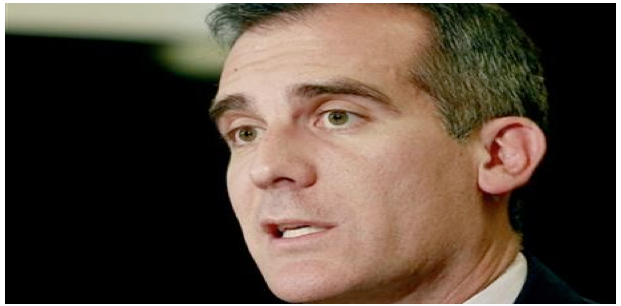CommentsLA’s CHANGE AGENTS--Later this month, Los Angeles Mayor Eric Garcetti (photo) will present his 2016-17 Budget to the City of Los Angeles.
Last June, as part of the chartered mission "to promote more citizen participation in government and make government more responsive to local needs,” each Neighborhood Council selected two Budget Representatives who attended Neighborhood Council Budget Day at City Hall. The day included presentations from city officials on the fiscal health of the city and visions for the years to come.
Following this, the Budget Representatives gathered within their respective planning regions to discuss local priorities and then selected three NC Budget Advocates to take a deeper dive into the budget process, and then provide feedback to the Mayor and Council Members.
In the months that followed, the NC Budget Advocates met with city department officials, surveyed the public and produced a white paper entitled "Building Trust in City Hall".
The white paper addresses opportunities for the city in six categories:
- Infrastructure
- Homelessness
- Education
- Transportation
- Sustainability
- Transparency
On March 4, the NC Budget Advocates presented the white paper to the Mayor and his budget staff and discussed the upcoming budget. (photo above.)
After a presentation of the highlights of the white paper, the Mayor introduced his themes for the budget:
- Building the economy
- Building faith in City Hall
- Rebuilding the Port, Airport and Roads
The Mayor then proceeded to provide thoughts on how the two sets of priorities can come together.
On the issue of Infrastructure, the Mayor acknowledged the importance of more long term planning for the budget and infrastructure. At several points he spoke of a ballot measure to generate additional funds for regional transportation which would include local carve-outs for street and sidewalk repair. He also noted the importance of basic tasks like building a more precise inventory of city assets and making procurement more efficient.
To address Homelessness, the Mayor agreed that the approach needs to be multi-jurisdictional in nature and sited progress in working through jurisdictional and partisan barriers to maximize and focus resources. He also spoke of the importance of common sense solutions such as regional service centers where individuals can store their belongings near where they attend job interviews or conduct other business aimed at moving them forward.
When posed with the idea of equating the current situation with more conventional disasters that result in significant federal support, the Mayor responded that this correlation has been expressed, but that there has not been a meeting of the minds with federal officials. A commercial transfer tax and luxury housing tax were mentioned as possible sources of additional funding.
Although the Los Angeles Unified School District budget is a separate entity, the Mayor spoke of a promising start for new Superintendent Michelle King, and is hoping to open up schools to add to the city’s parks and recreation capacity, improve the student/counselor ratio and provide more job opportunities for young people. With Los Angeles being at the center of the entertainment industry, he noted there should be more arts education.
When it came to Transportation, the Mayor agreed with the white paper’s call for updated community based solutions and reiterated the need for a ballot measure that would accelerate transportation projects and provide relief for failing transportation infrastructure.
In moving the city forward toward Sustainability, the Mayor cited success in developing responses to earthquakes, violent extremism and cyber security threats, and referenced specific targets for water reduction and electric vehicle charging infrastructure.
On the topic of Transparency the Mayor acknowledged the need to revisit LAPD disciplinary procedures that are a century old and based upon military justice procedures.
The overriding message from the Mayor was that we have established a baseline for city services that needs to be built on and approved, and that cuts to basic services are not on the table. He understands that a more functional city can generate more revenue.
As the meeting came to a close, the Mayor proposed a follow-up meeting in the fall to discuss synergies and disconnects in our budget priorities and also reiterated a willingness to initiate additional metrics to his operational dashboard as a means of quantifying new and existing priorities.
Once the Mayor’s budget is presented to the public, the Budget Advocates will have an ongoing presence at Budget and Finance and City Council hearings, continuing to serve as the voice for any priorities that are under-represented in the Mayor’s budget proposal.
In June, after the budget has been adopted, a new group of Budget Representatives will be selected, and the mission of Building Trust in City Hall will continue.
(Scott Bytof is a member of the Downtown Los Angeles Neighborhood Council, is a Neighborhood Council Budget Advocate and can be followed at twitter.com/sbytof) Prepped for CityWatch by Linda Abrams.
















